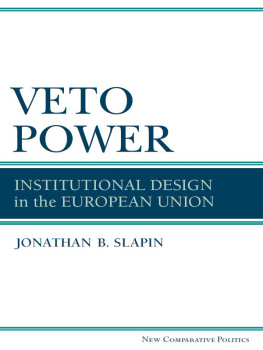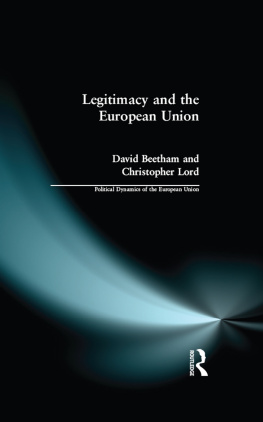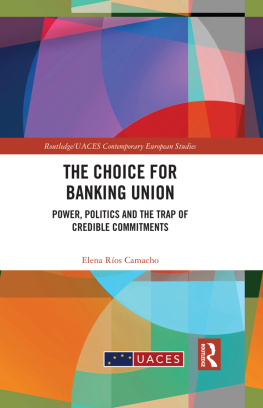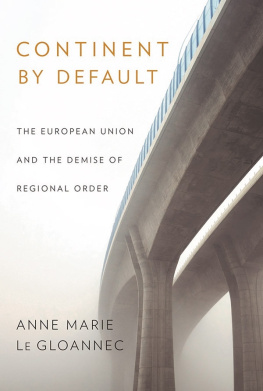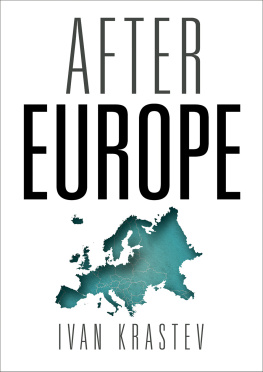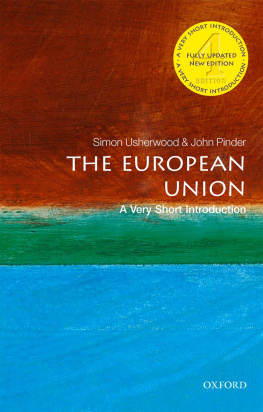Slapin - Veto Power: Institutional Design in the European Union
Here you can read online Slapin - Veto Power: Institutional Design in the European Union full text of the book (entire story) in english for free. Download pdf and epub, get meaning, cover and reviews about this ebook. year: 2018, publisher: The University of Michigan Press, genre: Politics. Description of the work, (preface) as well as reviews are available. Best literature library LitArk.com created for fans of good reading and offers a wide selection of genres:
Romance novel
Science fiction
Adventure
Detective
Science
History
Home and family
Prose
Art
Politics
Computer
Non-fiction
Religion
Business
Children
Humor
Choose a favorite category and find really read worthwhile books. Enjoy immersion in the world of imagination, feel the emotions of the characters or learn something new for yourself, make an fascinating discovery.
- Book:Veto Power: Institutional Design in the European Union
- Author:
- Publisher:The University of Michigan Press
- Genre:
- Year:2018
- Rating:5 / 5
- Favourites:Add to favourites
- Your mark:
- 100
- 1
- 2
- 3
- 4
- 5
Veto Power: Institutional Design in the European Union: summary, description and annotation
We offer to read an annotation, description, summary or preface (depends on what the author of the book "Veto Power: Institutional Design in the European Union" wrote himself). If you haven't found the necessary information about the book — write in the comments, we will try to find it.
Slapin: author's other books
Who wrote Veto Power: Institutional Design in the European Union? Find out the surname, the name of the author of the book and a list of all author's works by series.
Veto Power: Institutional Design in the European Union — read online for free the complete book (whole text) full work
Below is the text of the book, divided by pages. System saving the place of the last page read, allows you to conveniently read the book "Veto Power: Institutional Design in the European Union" online for free, without having to search again every time where you left off. Put a bookmark, and you can go to the page where you finished reading at any time.
Font size:
Interval:
Bookmark:
 Page i Page ii
Page i Page ii NEW COMPARATIVE POLITICS
Series Editor
Michael Laver, New York University
Editorial Board
Ken Benoit, Trinity College, Dublin
Gary Cox, University of California, San Diego
Simon Hix, London School of Economics
John Huber, Columbia University
Herbert Kitschelt, Duke University
G. Bingham Powell, University of Rochester
Kaare Strm, University of California, San Diego
George Tsebelis, University of Michigan
Leonard Wantchekon, New York University
The New Comparative Politics series brings together cutting-edge work on social conflict, political economy, and institutional development. Whatever its substantive focus, each book in the series builds on solid theoretical foundations; uses rigorous empirical analysis; and deals with timely, politically relevant questions.
Curbing Bailouts: Bank Crises and Democratic Accountability in Comparative Perspective
Guillermo Rosas
The Madisonian Turn: Political Parties and Parliamentary Demoaacy in Nordic Europe
Edited by Torbjrn Bergman and Kaare Strm
Political Survival of Small Parties in Europe
Jae-Jae Spoon
Veto Power: Institutional Design in the European Union
Jonathan B. Slapin
Page iiiJonathan B. Slapin
The University of Michigan Press
Ann Arbor
Copyright by the University of Michigan 2011
All rights reserved
This book may not be reproduced, in whole or in part, including illustrations, in any form (beyond that copying permitted by Sections 107 and 108 of the U.S. Copyright Law and except by reviewers for the public press), without written permission from the publisher.
Published in the United States of America by
The University of Michigan Press
Manufactured in the United States of America Printed on acid-free paper
Printed on acid-free paper
2014 2013 2012 2011 4 3 2 1
A CIP catalog record for this book is available from the British Library.
ISBN 978-0-472-11793-2 (cloth)
ISBN 978-0-472-02775-0 (e-book)
To Aurelija and Benjamin
Page vi Page viiAs this project has progressed from some rather inchoate ideas about European integration to a full-fledged book, I have incurred numerous debts to the individuals and institutions who have supported me. I will attempt to acknowledge as many of them as possible, although it is impossible to mention them all. The core idea for this book can be traced to my time at the University of Konstanz, Germany, where I first developed my interest in the processes of European integration. While at Konstanz, Thomas Knig was first kind enough to work with me as a rather naive undergraduate, then again as a DAAD fellow, and lastly during summers while I was a graduate student at UCLA. He has kept me plied with interesting and innovative data the entire time. For that I am eternally grateful.
At UCLA I benefited from a wonderfully supportive intellectual environment. I presented this project at various stages to the methods and formal theory workshops run by Jeff Lewis, James Honaker, and Kathy Bawn. I am grateful to my advisors, Kathy Bawn, Ron Rogowski, Jean Laurent Rosenthal, and most especially my committee chair, George Tsebelis, for their support and feedback. In addition, my friends from grad school, especially Julia Gray, Chris Jensen and Sven-Oliver Proksch, continue to read and provide me with invaluable feedback on my work, including vast swathes of this project.
Many others have commented on sections of this book at various points in time, and I have greatly benefited from numerous stimulating discussions with colleagues. They include Ken Benoit, Lisa Blaydes, Raj Chari, Ken Fernandez, Geoff Garrett, Tim Groseclose, Eunyoung Ha, Ted Jelen, Joe Jupille, Dan Kelemen, Michele Kuenzi, Rene Lindstadt, Gail McElroy, Andrew Moravcsik, Will Phelan, Gerald Schneider, Art Stein, John Strand, Mike Thies, John Tuman, John Zaller, several anonymous reviewers, numerous conference participants, and many others to whom I apologize for not remembering. I am especially Page xii grateful to Michael Laver, the New Comparative Politics series editor, and the editors at the University of Michigan Press, Melody Herr in particular, for supporting me in this project. The University of Nevada, Las Vegas, Trinity College, Dublin, and the University of Houston employed me and provided me with funding as I transformed the manuscript into a proper book.
Lastly, I must thank my family for all their loving support. My parents have supported my academic adventures, intellectually, emotionally and financially, from a very young age. My wife, Aurelija, has been a constant source of encouragement and strength. And Ben has both kept me up at night and made me laugh as I put the finishing touches on the manuscript. To all of you, and the many I haven't mentioned, thanks!
Some of the findings in this book have been previously published in journal articles, and I wish to thank the publishers of International Organization, European Union Politics, and Journal of Theoretical Politics for allowing me to publish revised and updated versions of these findings here.
are a revised version of an article that originally was published as Bargaining Power at Europe's Intergovernmental Conferences: Testing Institutional and Intergovernmental Theories, in International Organization 62, no. 1 (2008): 131162, by Cambridge University Press.
is a revised version of an article that originally was published as Who Is Powerful? Examining Preferences and Testing Sources of Bargaining Strength at European Intergovernmental Conferences, in European Union Politics 7, no. 1 (2006): 5176, by SAGE Publications Ltd./SAGE Publications, Inc.
is a revised version of an article that originally was published as Exit, Voice, and Cooperation: Bargaining Power in International Organizations and Federal Systems, in Journal of Theoretical Politics 21, no. 2 (2009): 187-211, by SAGE Publications Ltd./SAGE Publications, Inc.
Page 1Many major breakthroughs in European integration have occurred during intergovernmental conferences (IGCs), the forums at which European Union (EU) member states negotiate European treaties. Since the founding of the European Communities with the Treaty of Rome, member states have completed a common market, created a single currency, and developed European citizenship to complement national citizenship. Less visibly to European citizens, but of equal importance for the internal workings of EU, treaty negotiations have produced significant changes to the EU's political institutions. They have repeatedly altered the qualified majority voting rule in the Council of Ministers, the chamber of the EU's legislative branch representing the member states; changed the size of the European Commission; and increased the powers of the directly elected European Parliament. These institutional changes have had a lasting impact on how the EU produces legislation.
This book explores sources of bargaining power at these IGCs. It examines which member states achieve their goals and why. While previous scholarship on intergovernmental conferences has tended to see these treaties as big bang moments driving EU integration (e.g. Moravcsik 1998), my goal is not to explain the entirety, or even most, of EU integration through IGCs. Indeed, much of the EU's greatest impact on member states and their citizens occurs through the legislative process the drafting of EU directives and regulations which happens between intergovernmental conferences. The EU legislates on labor policy, environmental law, public health and safety, and numerous other issues. It has set standards for auto emissions, clean bathing water, working hours, and it has even regulated cell phone roaming charges. IGCs are important for drafting the treaties that create the institutional framework within which this important legislation is produced. Therefore, the approach taken here will be to examine IGC Page 2 negotiations in a manner similar to constitutional negotiations where states design institutions that govern their future interactions.
Next pageFont size:
Interval:
Bookmark:
Similar books «Veto Power: Institutional Design in the European Union»
Look at similar books to Veto Power: Institutional Design in the European Union. We have selected literature similar in name and meaning in the hope of providing readers with more options to find new, interesting, not yet read works.
Discussion, reviews of the book Veto Power: Institutional Design in the European Union and just readers' own opinions. Leave your comments, write what you think about the work, its meaning or the main characters. Specify what exactly you liked and what you didn't like, and why you think so.

